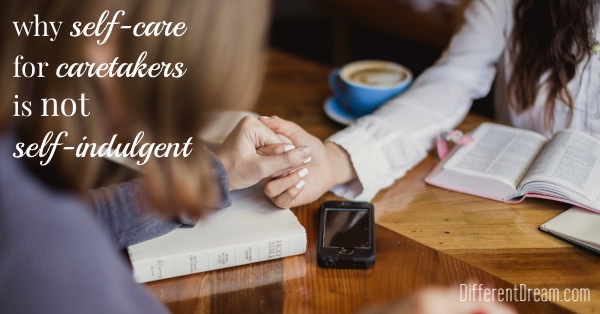Caring for the Caretaker Is Essential

Caring for the Caretaker isn’t self-indulgent, as guest blogger Laurie McLean knows. It is absolutely essential. That’s why Laurie is here to tell you about an amazing caring for the caretaker resource she’s compiled.
Parents of children with invisible disabilities often feel conflicted and complicated emotions.
On the one hand, their child may be considered “high functioning” so they feel they have no right to be overwhelmed or frustrated.
However, parenting a child with an invisible disability is stressful due to the very nature of the disability being invisible.
While we hope that our child will be accepted and their strengths acknowledged, we often have to deal with the reality that their struggles are often misunderstood.
Our lives are spent simultaneously supporting our children so they can succeed in a predominantly neurotypical world and shouting from the rooftops that they have a disability that causes them to need intervention when they are not succeeding.
Parenting a child with autism, ADHD, anxiety, and other disorders that affect behavior can be challenging.
We parents often feel guilt and shame when our children exhibit behavioral difficulties that are manifestations of their disabilities because, to the general public, it may look like they are simply misbehaving.
Caretakers of children with invisible disabilities spend an inordinate amount of time researching, battling for services, advocating, explaining, educating… it can all be very exhausting.
Parents of children with invisible disabilities need to focus on progress, not perfection.
People, in general, will celebrate each milestone of a child who very clearly has a visible disability.
For instance, we will all rally behind a child with cerebral palsy who takes their first step.
This is something concrete that we can see and understand. These children work hard in physical therapy to achieve these goals.
It is not as easy to see the growth in a child with autism who may struggle to understand non-verbal social cues.
Likewise, when a child with ADHD who struggles with impulse control is able to regulate their sensory needs and focus during a lesson it is not always recognized.
These are expected behaviors and many feel they there is no need to celebrate when a child is able to comply with the general rules.
The outside world may never understand what it took to get your child to that place.
This reality can be frustrating for us as special needs parents. Our children work very hard to do what may come naturally to other children.
When we start to feel like life is unfair and that we are simply tired of the fight, we need a change in perspective.
Typically, when I get to this point, I know that I have neglected my own self-care.
It is easy to get lost in the role of caretaker. We immerse ourselves in the battle of helping our children.
While a noble cause, we must remember to take care of ourselves in order to be the parent our children really need.
After all, how effective will we be if we experience a breakdown due to lack of self-care?
The high level of burnout amongst special needs parents is alarming.
Self-care for caretakers can be tricky as we are often inundated with our responsibilities and lack the time, energy and resources.
Caring for the Caretaker is a virtual bundle of self-care resources that will help you practice self-care on your own time when it works for you.
You can grab the Caring for the Caretaker resource for a 40% discount, only for Different Dream readers.
You can learn to not just survive as a special needs parent, but to thrive and be the parent you want to be for your child.
Parenting children with invisible disabilities may pose a unique challenge. But ensuring that we are taking care of our needs with the Caring for the Caretaker resource will enable you to parent your child with confidence.
Do you like what you see at DifferentDream.com? You can receive more great content by subscribing to Different Dream newsletter and signing up for the daily RSS feed delivered to your email inbox. You can sign up for the first in the pop up box and the second at the bottom of this page.
By Laurie McLean
Laurie McLean is a blogger, special needs parent, coffee fiend, dog lover, special education advocate and recovering perfectionist interested in balance, humor and self-care. She helps women learn to give themselves grace while they simplify their lives and make the most of their motherhood journey, no matter what unexpected things may come their way. You can visit her blog, Life with a Side of the Unexpected or check out her page on Facebook.
1 Comment
Submit a Comment
Subscribe for Updates from Jolene
Related Posts
What’s Working on Your ADHD Journey?
Guest blogger Lisa Pelissier provides ADHD management tips from her own journey and asks, “What’s working on your ADHD journey?”
Enjoying the Holidays with a Food Allergy
Jolene talks about her own family’s struggles and explains her strategies for enjoying the holidays with a food allergy.
God’s Plans for our Children are Like a Puzzle
God’s plans for our children are like a puzzle larger than any Sandy Ramsey-Trayvick has ever completed. In today’s post she describes how putting together jigsaw puzzles had shown her to trust in God’s plans for her kids. I began doing jigsaw puzzles again while we...






All this is very interesting to me. I can see how parents get very frustrated not only with working with their special needs child but dealing with people on the outside who don’t deal with the same issues as the parent of the special needs child. I really feel for the special needs family.